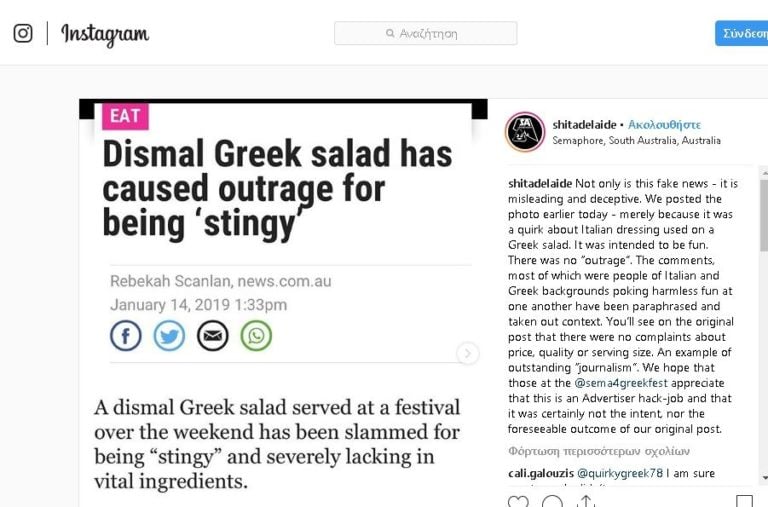More than 35,000 South Australians flocked to the Semaphore beach last weekend, to partake in the annual Greek Festival, organised by the the Greek Orthodox Community of the Nativity of Christ Port Adelaide & Environs. Now in its fourth decade, the festival is one of the staples of the SA annual festival calendar and seems to grow every year, attracting more Greeks – and non-Greeks, who gleefully immerse themselves into all things Greek – from music and traditional dancing to the cornucopia of delicacies that are a must for every self-respecting Greek event.
A small army of tireless ‘yiayiades’ selflessly dedicated dozens of work hours to create home-made mouth-watering ‘pitas’ that brought grown men to tears, particularly non-Greeks who discovered this unknown gastronomical pleasure for the first time. Other volunteers produced and sold record-breaking numbers (organisers talk about more than 40,000) honey-rich loukoumades. And of course, as in every Greek feast, there were epic quantities of charcoal-grilled meat of every kind on offer – oh, yes, and some salad too.
It is interesting that out of all these components that made the 40th Semaphore Greek Festival an immense success, it is the aforementioned salad that made news, taking centre-stage in both Greek community outlets and mainstream media.
“Debate sparked over ‘stingy’ Greek salad sold at a festival,” reads the Daily Mail Australia headline, while news.com.au echoing “Dismal Greek salad shamed on Instagram.” Soon, the Greek online ‘news’ squad picked up talking about the ‘outrage’ caused by the dish.
By ‘outrage’, we should clarify that we mean the usual flood of unsolicited opinions, insults and exaggeration that seems to describe online commentary in social media. What sparked it this time round was the ingredients of the pre-packaged dish labeled ‘Greek Salad’: tomatoes (so far so good, Adelaide’s tomatoes are delicious), cucumber, onion, capsicum (red, not green, but still), black ‘kalamata-type’ olives and – wait for it – lettuce! I know, right? Doesn’t that make you furious? Don’t you feel fumes coming out of your ears, thinking that some green leafy thing would invade a ‘Greek’ salad? No? How about if you learnt that there was not a speck of feta cheese in the plastic container? Worse of all, what if you saw a small pack of ‘italian dressing’ offered along? Now, don’t you feel that the least appropriate reaction to this insult would be for Leonidas and his 300 warriors to rise from the dead and slay anyone responsible?
No? Then maybe you’re just a normal human being and not an online commentator. Or, at least, not a victim of the ‘outrage’ machine that is relentlessly hijacking any news story on social media.
The whole thing is indicative of the way public discourse takes place today and the state of the current media culture. It all started with a photo of the Greek salad paired with the Italian dressing, posted on an instagram account, characteristically named – wait for it – ‘ShitAdelaide‘. As anyone with half a brain can assume, the account pokes fun at minor #fails (to use some 2009 lingo, in ’10 year challenge’ mode) around the SA capital. But it is 2019, the click-bait media machine is hungry for more fodder to be put into the 24-news-cycle, it is hungry for outrage. Picking up the story from instagram, ‘News.com.au’ blew up the non-story out of proportion; the other news outlets picked up – and guess what? Soon, there was indeed outrage – not by anyone who was actually at the festival of course, but by the usual suspects – the trigger-happy keyboard warriors who never fail to comment on anything.
Reporting about a non-existent outrage, the click-bait machine actually managed to create it. Mission accomplished.
In this context, it is no wonder that the most serious and sober voice was that of Shit Adelaide: “Not only is this fake news – it is misleading and deceptive,” they wrote on a consequent Instagram post, under the photo of the news.com.au headline. “We posted the photo earlier today – merely because it was a quirk about Italian dressing used on a Greek salad. It was intended to be fun. There was no “outrage”. The comments, most of which were people of Italian and Greek backgrounds poking harmless fun at one another have been paraphrased and taken out context. You’ll see on the original post that there were no complaints about price, quality or serving size. An example of outstanding “journalism”. We hope that those at the @sema4greekfest appreciate that this is an Advertiser hack-job and that it was certainly not the intent, nor the foreseeable outcome of our original post.”

Yes, leave it to the Murdoch empire to create a storm in a teacup and stir emotions, in their relentless quest for sensationalism. If anything this non-issue was another perfect example of the dissonance between the real world and the online world, showcasing the chasm that often exists between a real experience and its digital reflection.
Meanwhile, in sunny, friendly, relaxed Adelaide, the Semaphore Greek Festival volunteers are still taking some well-deserved rest to recuperate from the frantic two-days-straight partying and eating and dancing and singing. The community is getting ready to start planning the 41st edition of the Festival. And some of the festival-goers are still smiling in memory of the delicious Greek feast and all the delicacies they tasted. Because this is their reality of the festival experience. It is pretty safe to say that the vast majority of the 35,000 revellers not only did not realise there was a “Greek Salad outrage”, many of them did not even bother to check that there is salad on offer in the first place.
Because, who goes to a Greek festival to eat salad, right?









